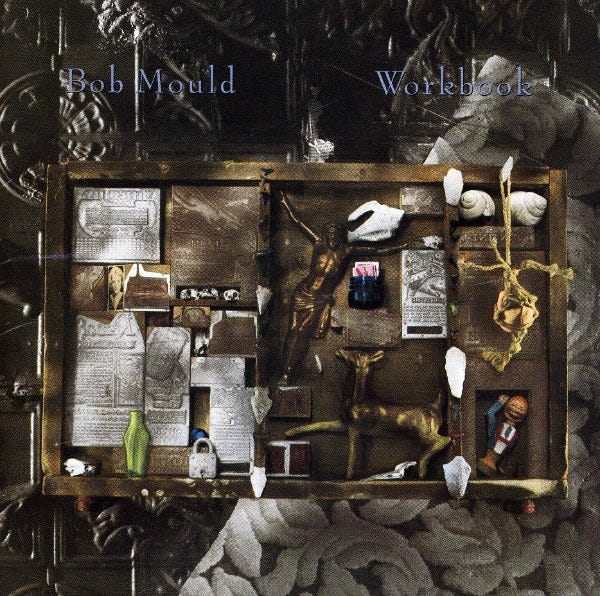Bob Mould — Workbook
26.October.2020
Bob Mould
Workbook
1989
Hüsker Dü was one of the most influential bands to emerge from the post-punk era of the late 70s/early 80s. They also became both critics darlings and were readily adopted by the growing college radio scene.
Hüsker Dü lasted just nine years but has cast a long and continuous shadow in music.
One might think that the first solo release from one of the principal songwriters of Hüsker Dü would have a bit more bombast. If one would think that, they would be wrong.
Released in April of 1989, Bob Mould’s Workbook is a harbinger of the music just around the corner. The record’s acoustic elements would reverberate in R.E.M.’s seminal Automatic for the People, and Nirvana’s In Utero similarly used cellos as Mould employs here.
The album opens with a brilliant little instrumental called “Sunspots” that sounds almost like it was written as an exercise to warm up a guitar player's fingers before a gig.
And then “Wishing Well” kicks in with the crashing drums of journeyman drummer Anton Fier come along with Pere Ubu bassist Tony Maimone and cellist Jane Scarpantoni (who would go on to become THE alternative cellist on call in the 1990s). This song has the bombast of his former band but a much more approachable sonic sheen.
“Heartbreak, a Stranger” is a delicate song about a different kind of break-up. The song is smartly bookended with verses that encapsulate the essence of a heartbreak.
Intro Verse
Days come, days go by
So it matters, so you say
But it’s all coming back in a way
And nothing will ever change
The words exchanged for revenge inside
You know these things take time
Outro Verse
Days come, days go by
So it matters, so you say
But it’s all coming back in a way
And everyone knows a way
And everybody runs away
From somebody who cries
After the breakup of Hüsker Dü, Mould retreated to his farm in Minnesota, where he would spend the next year writing. In January of 2020, Mould recalled the inspiration of Workbook’s first single, “See a Little Light”:
“I don’t know if it was inspired by a sunny day or one of the chickens on the farm. But what an optimistic song given how isolated I was and how shocking life after Hüsker Dü was for me.”
It’s virtually impossible to discuss Bob Mould and not in some way discuss the acrimonious breakup of Hüsker Dü. It is, by all accounts, about as fucked up as fucked up can be. And if you’re looking for Mould’s response or reaction on Workbook, it’s mostly absent — mostly.
In a 1994 article in Rolling Stone, Mould said:
“There’s people who think I’m still sending missiles to [Hüsker Dü drummer] Grant Hart . Sorry to disappoint you, but I took care of that about five years ago. Check out side one, song five on Workbook.”
Poison Years
Poison thoughts in my mind
Got to free myself from this bind
I know I’m a reasoning guy
In an act like Jesus Christ
Stare into the sun
You don’t see eye to eye with anyone
I throw it all away (Don’t talk to me no more)
The more I think, the less I’ve got to say (I don’t remember you no more)
About these poison years: it’s just a memory
And every time you knock me down
It’s all that I can do to get up off the ground
Pull myself apart again
At the end of this rope
Rope at the end of the line
I see you swing by your neck on a vine
Treason is the reason for my poison years
Leaves are changing seasons of my poison years
Poison years in my mind
Got to free myself from this bind
I know I’m a reasoning guy
Every time you knock me down
It’s all that I can do to get up
To get up off the ground
Produced by Mould himself, even though the drum sound is a little 80s, by and large, the entire album has a transcendent sound to it.
CRITICS:
Robert Christgau in the Village Voice wrote: “…between the cello and the acoustic guitar and the moderato and the lyric sheet that ought to have a little typeface note like at the end of a Borzoi book, I find myself disliking their record intensely. Until the raving finale, it’s so respectable, so cautious, as if honest thought were a suitable substitute for wisdom, sarcasm, a good joke, or a suicide run for the next intro.”
Parry Gettelman of The Orlando Sentinel said: “All of the songs get you sooner or later: The more you play the album, the better it gets. Workbook doesn’t grab you immediately by the throat the way the Huskers’ albums did. It’s more contained — and lyrically more accomplished.
David Silverman of The Chicago Tribune wrote: “Shaken by Husker Du`s rapid self-destruction, guitarist Bob Mould left Minneapolis last year. Isolated on his farm 60 miles from the city, Mould crafted his response to the turmoil. The result is Workbook, a stunning departure from the thrash-pop that distinguished Husker Du as one of the decade`s most influential bands. Pain and frustration are interwoven with a modicum of hope and real-world sense in the lyrics. Having parked his beloved Gibson, Mould’s acoustic guitar is backed by Anton Fier’s drums, Tony Maimone’s bass, and the melancholy cello of Jane Scarpantoni.
Although Workbook peaked at #127 on Billboard’s album chart, it is still widely regarded as a benchmark work in the career of Bob Mould.
Mould’s next band, Sugar, would open the floodgates to all of Bob Mould’s earlier work, including Workbook.




